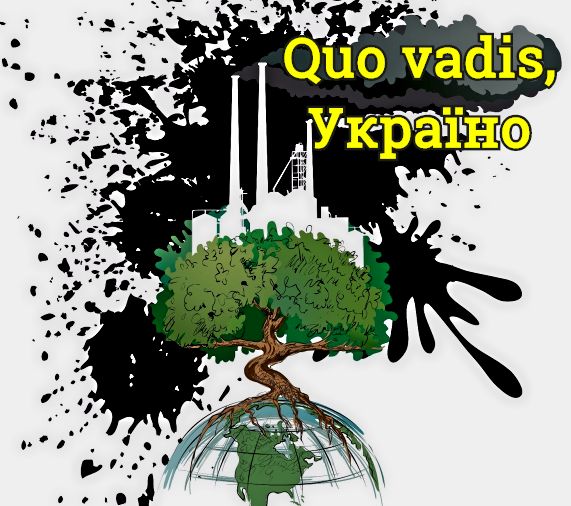On 26.11.2015, the Parliament of Ukraine considered in the first reading the draft law on environmental impact assessment that the Parliament did not adopt and returned for additional rework because of the opposition on behalf of business lobby.
Environmental impact assessment (EIA) is a worldwide known effective procedure of assessing impact of planned activity on the environment that guarantees environmental safety and safety for human health and life. Lack in Ukraine of the institute of environmental impact assessment causes catastrophic, often nonreversible, consequences for human life when realization of investment projects brings profit to small group of businesspersons while thousands of Ukrainians suffer from this. The current situation in Ukraine is lack of any control when you do not know what factory is built next to your house, why your kids get sick, why the level of cancer is the highest in Europe, why mortality rate is so high and average life expectancy so short in comparison with western countries.

The countries that care about health and life of their citizens ensure balance of economic and environmental component in their development and surely have an effective mechanism of environmental impact assessment. Canada has a central authority dealing with environmental impact assessment, the European Union has had environmental impact assessment of state and private projects since 1985. Introduction of the mechanism of environmental impact assessment is among requirements to Ukraine related to European integration. If we really want to go to Europe, then adoption of the draft law #2009a is a concrete practical step in this direction. Environmental impact assessment is the procedure that helps public servants to make reasonable decisions. In the course of EIA, interests of business, state, people and the environment are balanced.
Emotionality of speeches of deputies O. Prodan and V. Pynzenyk without grounded arguments about the threats for business caused by environmental impact assessment procedure makes people think about their interest in supporting the current corruption schemes in this sphere and their low competence regarding Ukraine’ international obligations and Article 16 of the Constitution of Ukraine about guarantee of environmental safety. Ms. Prodan in her speech resolutely says that the law introduces a new regulatory corruption tool. Of course, this is our current reality when law-makers even reading the draft law developed on the basis of the EU Directive 2011/92/EC see what they used to see or want to see – possibilities for corruption. Also, really surprising is the argument that launching the procedure of environmental impact assessment will block entrepreneurship, and Ukraine will stop any production. A logical question arises: “Why do the European countries that support the principles reflected in the draft law belong to the most economically developed while in Ukraine that lacks the EIA mechanism the environment is in poor state, the economy is on the decline and corruption is flourishing?” This is because many public officials follow the principle “the worse, the better” and under conditions of lack of control it is much easier to satisfy business interests.
The deputy Matviyenkov from Mariupol – the city suffering most from environmental problems – who proposed to develop a complex national environmental program should have known that Ukraine has had many different environmental strategies and programs that in no way improved the state of environment. Introduction of European instruments of EIA with clear transparent procedures should become the way to practical guarantee of environmental safety.
Our practical experience shows that non-corrupt business is interested in launching environmental impact assessment that will allow them to realize the principle of corporate responsibility and work according to the world standards of openness and transparency. Rejection of new European principles of work when the public has impact on the process of decision-making regarding environmentally hazardous objects proves the lack of will to change the corruption system when any decision or expert conclusion can be bought and that environmental safety that in Europe belongs to top priorities in state policy is dislodged by financial business interests.
The current Parliament of Ukraine showed again that they protect interests of their business. Ukraine for them is the territory where they make money. Ukrainians are the labor resource and the environment is the source of resources. Embezzlement of natural resources, deterioration of environmental situation, rise of mortality rate will continue as long as the Parliament adopt decisions in favor of lobbying groups instead of the state. We really want to believe that despite all the hindrances Ukraine will join the circle of the countries that realize importance of sustainable development of economic, environmental and social sphere and environmental safety for their citizens because we have to remember that “we did not inherited the environment from our parents, we borrowed it from our children”. We are open for discussion with people’s deputies who understand environmental safety as one of priorities of the state.
Below is the list of deputies who voted against or were absent:
http://w1.c1.rada.gov.ua/pls/radan_gs09/ns_golos?g_id=4835
Personal voting for additional rework of the draft law on environmental impact assessment (#2009a)
The group “European optimists”
Klympush- Tsyntsadze
Sotnyk
Romanova
Syumar
Syroyid
Lutsenko I. V.
The Committee of Environmental Policy of the Parliament of Ukraine
Lenskyi O. O.
Balytskyi
Moskalenko
Kolesnikov D. V.
Chepynoha V. M.
Anticorruption group of Petro Poroshenko block
Solovey
Firsov Y. P.
http://w1.c1.rada.gov.ua/pls/radan_gs09/ns_golos?g_id=4831
Signal voting on the draft law on environmental impact assessment (#2009a)
The group “European optimists”
Klympush- Tsyntsadze I. O.
Ptashnyk V. Y.
Dobrodomov D. Y.
Sotnyk
Romanova A. A.
Syumar V. P.
Syroyid O. I.
Leshchenko S. A.
Kiral’ S. I.
Mushak O. P.
Chernenko O. M.
The Committee of Environmental Policy of the Parliament of Ukraine
Balytskyi
Moskalenko
Kolesnikov D. V.
Chepynoha V. M.
Anticorruption group of Petro Poroshenko block
Chumak V. V.
Leshchenko S. A.
Bohomolets O. V.
Holub V. V.
Solovey
Firsov

